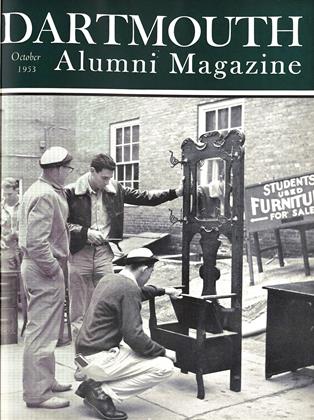Hanover's "new look" in the summer was newer than ever this year. The highly successful Commencement and reunion weekends were scarcely over before the College and town whipped into the summer activities that have become progressively more extensive as educational, cultural and recreational programs have developed in recent years.
The expectation that Hanover would have a record influx of visitors was correct. Four student guides conducted some 3500 visitors around the College; while the Information Booth, maintained on the Robinson Hall lawn by the College and the Hanover Chamber of Commerce, reported more than 10,000 tourists stopping for information, mostly about Dartmouth and the town. Carpenter Art Galleries, open in the afternoon for the second summer, had the satisfaction of more visitors than last year when the experiment was first tried.
For eight weeks in July and August the College was host to forty social scientists from all over the country who were enrolled in a Summer Institute of Mathematics sponsored by the Social Science Research Council and supported by a grant from the Ford Foundation. The higher mathematics they studied was of a formidable variety, found necessary by social scientists today if they are to express the complexities of social studies statistically and are to understand mathematical formulas and equations used increasingly in their field. A five-man faculty, headed by Prof. William G. Madow, chairman of the Statistical Research Laboratory at the University of Illinois, conducted classes, seminars and informal group sessions.
Another group that studied hard but for a shorter period were the 196 business executives attending the Graduate School of Credit and Financial Management held at Dartmouth for the fourth successive summer. At the end of the two-week course, conducted at Tuck School, 48 men who had completed three summers of study were graduated at exercises at which John J. Joseph, vice president of the Ohio Bell Telephone Company, was the main speaker. Both the enrollment and the graduating class were the largest since the Graduate School shifted to Hanover in 1950.
Baker Library was the center of summer study projects by many members of the Dartmouth faculty and also by a large number of visiting authors and scholars from other colleges and universities. The latter group this year numbered more than fifty who were doing research in a variety of fields. Baker Library held a reception for them in July and invited Dartmouth faculty members to meet them. At the circulation desk of the library this summer, it is reported, there appeared within the space of a few minutes Charles Jackson, Margaret Sanger, Paul Blanshard, and Judge Learned Hand.
A less adult visitation took place July 28-29 when the College staged its fifth annual summer camp Softball tournament. A tennis tournament was added this year, and all together more than 300 boys between the ages of 10 and 16 were in town as participants or spectators. Originally conceived by James D. Landauer '23, a summer resident in Hanover, the Softball tournament has grown into one of the top events of the summer season for boys' camps in New Hampshire and Vermont. As always, there were hundreds of other campers who enlivened the local scene throughout July and August.
While the transients came and went there were those who stayed put and kept the wheels of the College turning. Busiest of all perhaps was the newly reorganized Department of Plant and Operations which welcomed the summer period as a chance to catch up with general refurbishing and some new construction. The job of modernizing the lighting in Baker Library was virtually completed with the work done in the Reserve Room, and some interior remodeling was accomplished in McNutt and College Halls. In McNutt separate and enlarged offices were provided for the Office of Student Counseling and for the Placement Office. In College Hall, on the second floor of one wing, rooms are being created for the Dartmouth Christian Union, but these will not be ready until later in the fall. On the third floor, headquarters have been provided for the Undergraduate Council's Judiciary Committee, and other space, now in dormitory use, will eventually be converted into student activity offices.
A round-up by The Dartmouth indicated that an estimated $100,000 was spent by Dartmouth fraternities this summer for renovating and new furnishings. Pi Lambda Phi, which purchased the home of the late Dr. Carleton on Occom Ridge, undertook the most extensive program of this kind, while Delta Kappa Epsilon, its centennial celebration coming up October 17, did over the entire main floor and basement of its house on West Wheelock Street.
 View Full Issue
View Full Issue
More From This Issue
-
 Article
ArticleMr. President, LL.D.
October 1953 By EDWARD CONNERY LATHEM '51 -
 Class Notes
Class Notes1918
October 1953 By ERNEST H. FARLEY, W. CURTIS CLOVER, RICHARD P. WHITE -
 Article
ArticleThe Faculty
October 1953 By Harold L. Bond '42 -
 Class Notes
Class Notes1926
October 1953 By HERBERT H. HARWOOD, H. DONALD NORSTRAND, CARLETON BLUNT -
 Class Notes
Class Notes1912
October 1953 By HENRY K. URION, FLETCHER CLARK JR., HENRY B. VAN DYNE -
 Class Notes
Class Notes1948
October 1953 By FRANCIS R. DRURY JR., JOHN S. FENNO
Article
-
 Article
ArticleMR.J.B. HAGGERTY TO LEAVE HANOVER
December, 1915 -
 Article
ArticleCulver A. Modisette '50
January 1960 -
 Article
ArticleCollege with an Upper-case "C"
June 1976 -
 Article
ArticleSkiing
February 1955 By Cliff Jordan '45 -
 Article
ArticleSQUASH
March 1950 By Francis E. Merrill '26 -
 Article
ArticleIntrigue, Moral Ambiguity, and Saving the World
APRIL 1998 By Professor David Lindgren


